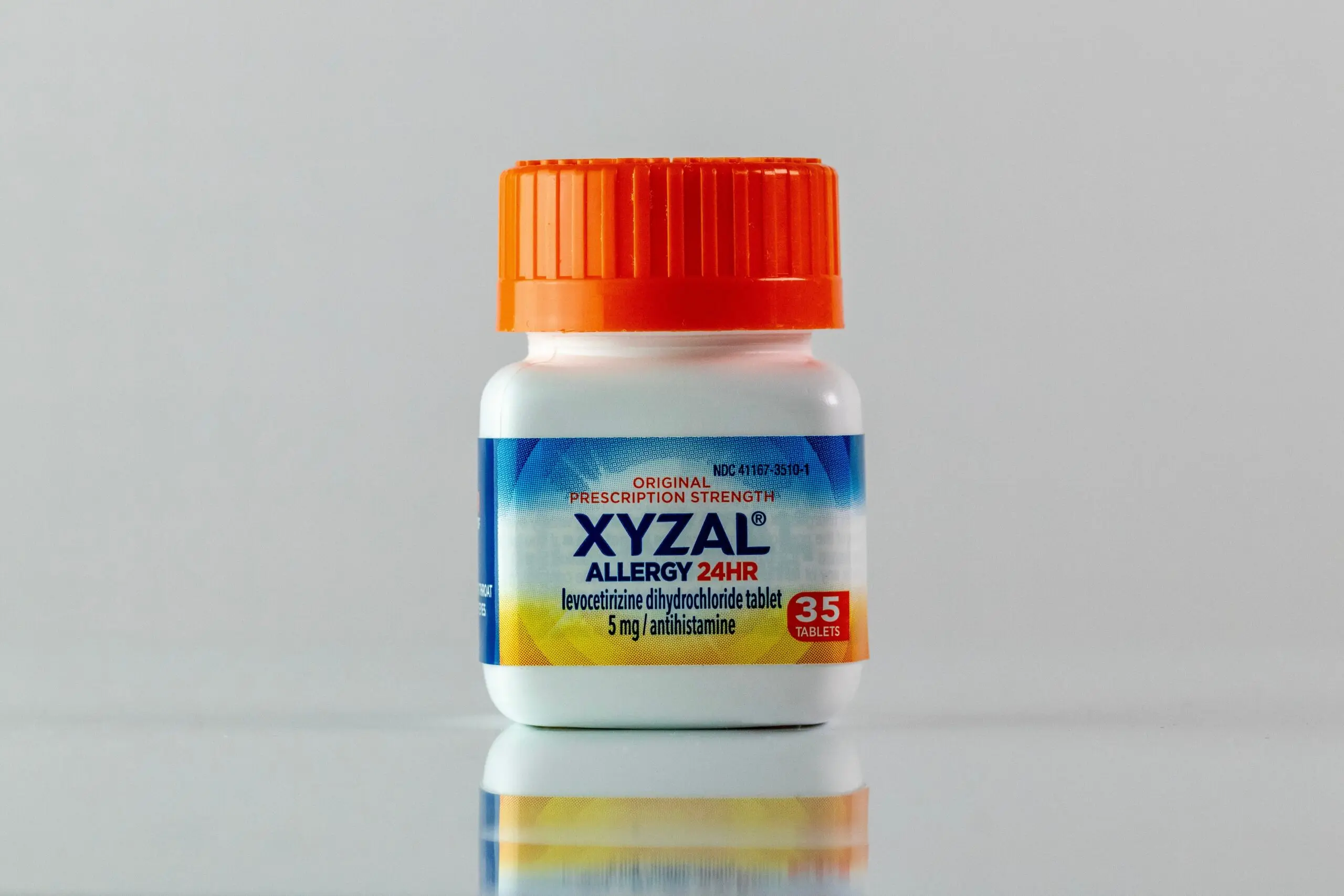Introduction
Levocetirizine is a second-generation antihistamine, serving as the pharmacologically active R-enantiomer of cetirizine. Commonly prescribed for chronic allergic rhinitis and chronic idiopathic urticaria, levocetirizine delivers high efficacy with a low risk of sedation, improving over first-generation antihistamines through minimisation of CNS side effects due to limited blood-brain barrier penetration.
Chemical Structure & Classification
- Class: Piperazine-based, second-generation H1-antihistamine
- Structure: (R)-2-[2-[4-[(R)-(4-chlorophenyl)phenylmethyl]-1-piperazinyl]ethoxy] acetic acid
- Key Features: Carboxyl group (reduces CNS penetration), aromatic rings (enhance receptor affinity), R-enantiomer (higher potency).
Mechanism of Action
Levocetirizine acts as a selective antagonist at peripheral H1-receptors, competitively inhibiting histamine binding in the respiratory tract, vasculature, and GI tract. This prevents classic allergy symptoms—vasodilation, increased permeability, pruritus, and wheal-and-flare skin reactions.
- Receptor affinity: 2x greater than cetirizine racemate; 5x versus S-enantiomer
- Onset: ~1 hour; Duration: ≥24 hours, supporting once-daily dosing.
Pharmacokinetics
Indications
Adverse Effects
Levocetirizine is generally well tolerated, but notable side effects include:
- Somnolence (low incidence)
- Fatigue
- Dry mouth (xerostomia)
- Nasopharyngitis, pharyngitis
- Headache, dizziness
- Serious: hypersensitivity, anaphylaxis, angioedema, seizures (rare)
In children: pyrexia, cough, epistaxis. Post-marketing: rare reports of aggression, visual disturbances, palpitations, hepatitis.
Contraindications & Precautions
- Hypersensitivity to levocetirizine or cetirizine
- End-stage renal disease
- Severe renal impairment in children <12 years
- Caution in patients predisposed to urinary retention
Special Populations
- Pregnancy/Lactation: Use with caution; insufficient human data. Appears in animal breast milk—avoid if possible.
- Geriatric/Renal impairment: Dose adjustment may be necessary.
Comparative Profile
Levocetirizine’s minimal CNS penetration and high receptor selectivity distinguish it from first-generation antihistamines (e.g., diphenhydramine) and make it one of the least sedating second-generation agents.
| Feature | Levocetirizine | Cetirizine | Diphenhydramine |
|---|---|---|---|
| Generation | 2nd | 2nd | 1st |
| Sedation | Lower | Moderate | High |
| Anticholinergic | Minimal | Minimal | Significant |
| Dosing (adult) | 5 mg OD | 10 mg OD | 25–50 mg q6h |
Conclusion
Levocetirizine is a potent, selective antagonist of peripheral H1-receptors, optimised for once-daily use. Its high efficacy, low sedation risk, and favorable safety profile support its status as a preferred agent for allergic rhinitis and chronic urticaria. Drug interactions and hepatic metabolism are minimal, making it safe for most patients, with renal function as the primary consideration for dosing.
References
- Goodman & Gilman’s The Pharmacological Basis of Therapeutics, 13th ed.
- Katzung BG, Basic and Clinical Pharmacology, 15th ed.
- Rang & Dale’s Pharmacology, 8th ed.
- Simons FER, Simons KJ. H1 Antihistamines: Current Status and Future Directions. World Allergy Organ J. 2021;14(6):100534.
- Mayo Clinic: Levocetirizine (oral route) – Side effects & dosage
- DrugBank: Levocetirizine profile
- ScienceDirect: Levocetirizine—an overview
- FIP Monograph: Levocetirizine Dihydrochloride
📚 AI Pharma Quiz Generator
🎉 Quiz Results
Medical Disclaimer
The medical information on this post is for general educational purposes only and is provided by Pharmacology Mentor. While we strive to keep content current and accurate, Pharmacology Mentor makes no representations or warranties, express or implied, regarding the completeness, accuracy, reliability, suitability, or availability of the post, the website, or any information, products, services, or related graphics for any purpose. This content is not a substitute for professional medical advice, diagnosis, or treatment; always seek the advice of your physician or other qualified health provider with any questions you may have regarding a medical condition and never disregard or delay seeking professional advice because of something you have read here. Reliance on any information provided is solely at your own risk.

